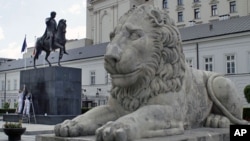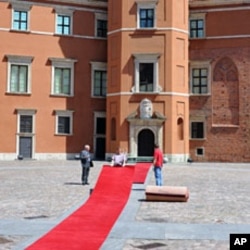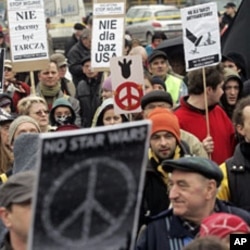U.S. President Barack Obama is preparing to visit Poland, the last stop on his European trip. Polish leaders are hoping the visit Friday will lead to progress on some of the thornier issues affecting U.S./Polish relations in recent years, namely missile defense and visa waivers.
It will be U.S. President Barack Obama's first visit to Poland, and one anxiously awaited in the Polish capital, where recent changes in U.S. defense policy have led to suspicions of diminishing American interest in the region.
Agenda
Obama will be meeting with Polish President Bronislaw Komorowski and Polish Prime Minister Donald Tusk. The U.S, leader is expected to dine Friday with a number of other Central European leaders, including the presidents of Germany, Hungary and the Baltic states.
High on the agenda will likely be economic cooperation and promoting democracy in neighboring Belarus and in the Middle East.
US military presence
But for the Polish side, the American military presence in the country will be one of the most pressing questions. Michal Baranowski, of the Warsaw office of the German Marshall Fund, explains why.
“The presence would signal continuous American engagement in Europe, and in Poland in particular, which provides a strengthened guarantee of security for Poland. So making sure that the U.S. still looks to this part of Europe is something key for the Polish public and the Polish politicians,” said Baranowski.
Until 2009, Poland and the Czech Republic had been slated to host an American anti-ballistic missile shield. But these plans were scrapped. Instead, more mobile SM-3 interceptors will be deployed in Poland, as well as a possible rotation of F-16 warplanes.
Disappointment
Former Polish Defense Minister Janusz Onyszkiewicz, now at the Warsaw-based Center for International Relations, says that for the Polish government, this was a disappointment.
“There was disappointment because we were very eager to have American military presence in Poland. I think that the Polish government, unfortunately, treated the whole issue much more in the area of symbolism and national prestige than in terms of down-to-earth politics,” said Onyszkiewicz.
He adds that missile defense in Poland is also being closely watched by Russia, uneasy at the prospect of American military hardware deployed so close to the Russian enclave of Kaliningrad.
“Russians, unfortunately, still think in terms of balance of power, not in terms of building their security on the basis of cooperation, on the basis of trust, on the basis of transparency. They would be quite ready to accept a system which would be ready to cope with medium to intermediate-range missiles," said Onyszkiewicz. "Everything else, which goes above this range, they would consider as diminishing their striking capability.”
One-sided?
Scrapping the Bush-era missile shield was widely seen in Poland as an American attempt to appease Russia at Poland’s expense. This, along with Poland’s unpopular involvement in Iraq and Afghanistan, made many Poles feel that their alliance with the United States was becoming increasingly one-sided. The feeling has not entirely subsided, says one woman.
“I think Russia is a more important partner for the United States when it comes to defense," said the woman. "Even though they promised that it all will happen here in Poland, that we are very important for them, it turns out when Russia said, 'No,' they changed their mind without taking Poland into consideration. We all have the feeling that we are giving so much, and all we get in return are promises.”
But as another woman explains, the most important issue for many Poles is something much more concrete: visa waivers. Unlike some of their neighbors, including Czechs and Hungarians, Poles still need visas to travel to the United States.
“I think that we are even treated as intruders, not having visas assigned and being always questioned when wanting to enter the country," another woman said. "To see a very sincere and binding answer to what will happen in terms of our visas and Polish people entering the U.S. - I think that this is the most important,”
Changing ties
The relationship between Poland and the United States has changed in the past few years, but as the German Marshall Fund’s Michal Baranowski explains, this may be for the best.
“The relationship needs to change from a country that is looking up to the United States, very unequal, and it has been changing. It is more mature, it is more based on interests rather than emotions, and goes beyond bilateral aspects,” said Baranowski.
White House officials say President Obama’s visit is intended to help reaffirm American commitment to Europe and to European security. Although they might be less eager than they once were, many in Poland are hoping for the same thing.















